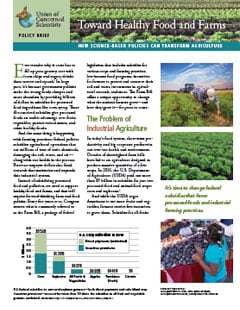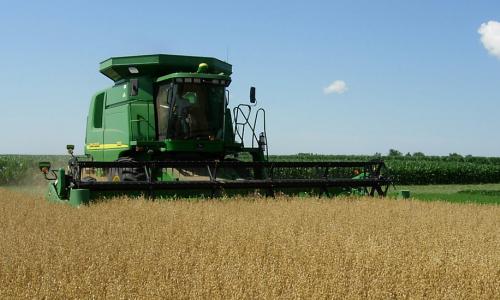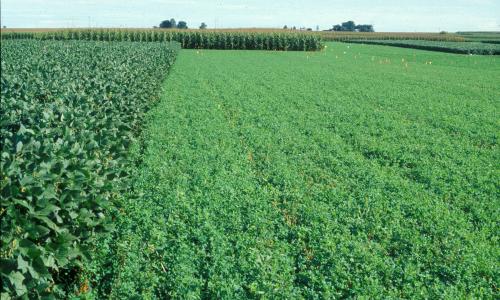Ever wonder why corn chips and sugary drinks cost less than carrots and squash? In large part, it’s because government policies make the wrong foods cheaper and more abundant. Billions of dollars in federal subsidies give processed foods an unfair advantage over fruits, vegetables, pasture-raised meats, and other healthy foods.
And it’s not just the health of our diet that current federal policy is bad for. The same subsidies that fill the nation’s shopping carts with processed foods also encourage agricultural practices that damage the soil, water, and air—and our health. Precious taxpayer dollars also fund research that maintains and expands this industrial system.
The solution: science-based sustainability
There’s a better way to grow our food. UCS has a science-based vision for the U.S. farming and food system in which farms are not factories, and do not rely heavily on fossil fuels, harmful pesticides, and synthetic fertilizers to produce huge quantities of just a few crops.
Instead, sustainable agriculture views farms as ecosystems made up of interacting elements—including soil, plants, insects, water and animals—that can be modified to solve problems, maximize yields, and conserve resources.
Sustainable agriculture can meet our food needs, protect the environment, and support thriving rural economies. But in order to make this vision a reality, we must begin shifting farm subsidies from processed foods and industrialized agriculture to healthy food and farming practices.
Policies for healthy food and farms
The U.S. food and farm landscape will not be transformed overnight. But we can take significant steps forward by adopting and expanding innovative policies grounded in the latest science and economics. The Farm Bill, which Congress renews every five years, provides a unique opportunity to change what the nation’s farmers grow—and how they grow it—for years to come.
In particular, UCS supports farm policies that will:
Expand the production and accessibility of healthy food. Appropriate tools include:
- Increased investment in local and regional food systems—including farmers markets, community-supported agriculture (CSA) arrangements, and food hubs—that will increase access for consumers across all income levels;
- New incentives for farmers to produce more organic, sustainable, and healthy food, especially fruits and vegetables; and
- A “safety net” of credit and risk management tools to support farmers who adopt sustainable and diversified practices.
Increase farmers’ adoption of sustainable agriculture and conservation practices that protect soil, water, human health, and ecosystems. This can be done through:
- Greater financial incentives for farmers who implement conservation measures and adopt science based sustainable, organic, and integrated crop or livestock production practices and systems;
- New rules that ensure farmers receiving federal subsidies employ at least a minimum level of conservation and limit their use of environmentally destructive practices.
Increase publicly funded research to improve and expand modern, sustainable food and farm systems. This research should seek to:
- Increase understanding of the ecosystems that support farming and the impacts of various management systems, practices, and technologies;
- Develop and refine innovative systems for sustainable, organic, and diversified food production, and ease farmers’ transitions to them;
- Foster the expansion of local and regional food systems, and better document their economic benefits;
- Increase the diversity of our agriculture system and promote resilience in the face of environmental challenges, through public crop and livestock breeding programs and other efforts.







